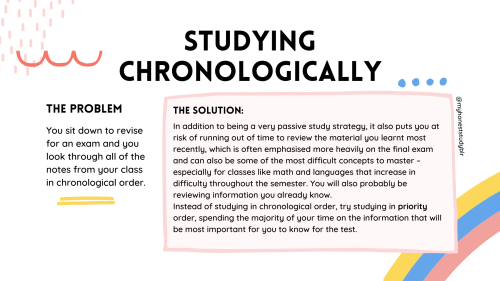How To Study W/ Mental Health Problems
How to study w/ mental health problems
Hi everyone! I was diagnosed with anxiety and depression a while back, and these are my tips on how to manage to be a student while also having mental health problems. If you’re struggling too much, however, please please please see if you can take a break from school- your health is so much more important than anything else!!!!! However, if you can and want to keep going, I hope these tips are useful.
1. Be realistic about what you can do
When I’m in a really bad anxious/depressive spell, things take me so much longer than usual. It’s important to take that into account when planning out your tasks, so you don’t end up with an enormous unfinished to-do-list and a mental breakdown. For example, last week, I had an essay to finish, and I spent a full day proofreading it one final time, since I could only do one paragraph at a time. Make sure to give yourself enough time and only do the tasks that are absolutely essential!
2. Know your own signs
In my case, my mental health goes up and down- I might be having a great time for a few weeks but then it’ll all go downhill again (like right now, I’m in a particularly difficult bit currently). By now, I know what signs to look out for so I know when my mental health will go downhill again, so I can prepare myself. Learn these signs (if you can) and when you notice them, either try to prevent yourself from going bad (which obvs isn’t always possible- I tried real hard this time but here we are again), or plan for when you do!
3. Make lists
For me, I can’t do anything without a list. My brain is already so off the rails that, if I don’t make lists, I will forget to do things, or maybe I just can’t be bothered. If I’m in a really bad time mental health-wise, I’ll put even the small things on there (like showering or cooking), to make sure I do them and to make me feel like I got a lot of stuff done in a day even when I’m not able to be productive uni-wise.
4. Talk to your teachers!
You all probably know this, but your teachers are there to help you, and 99.9% of the time, they will be more than happy to. If you’re going through a bad time, tell them this so they know why you’re not as prepared as usual/ they may be able to give you some extra guidance. For example, I have to write my thesis over the summer, but want to do this at home rather than in my uni town bc it’s better for me to be at home rn. I told my supervisor (insert a bunch of anxious crying from my side here), and he was incredibly nice and understanding. If (like me) you have anxiety, this sort of stuff will be scary, but I promise, it’ll be worth it!
5. Be kind to yourself
This is important in general, but if you have mental health problems, you have to accept that you’re not going to be able to be as productive as you want to be (the perfectionist inside of me died a little as I was writing it). There will be days when it feels like you’ve been hit by a bus and you just can’t do anything, and that’s fine. Just wake up every day, determined to make the best of whatever the universe has decided to throw at you. Good luck!
I hope this helped some of you- if you have any questions/ just need someone to talk to, please feel free to message me!!!
More Posts from Amandadiamond and Others
general study tips
this is just a quick list of study habits that work for me, as a straight a’s student
1. even if it’s not in your teacher’s presentation written on a slide, if you hear your teacher mention a fact, WRITE IT DOWN. you might need it later for a test.
2. when you’re rewriting your notes/compiling a study guide, pretend you’re making it for someone else. include everything, even if you think you know it. (unless you’re low on time, in which case, just write what you don’t know)
3. when you’re trying to learn a new concept, pretend you’re teaching it to someone else. this is a form of active learning, and the act of breaking the concept down into steps that you can teach will improve your understanding of the concept. (for the longest time, i actually didn’t even know this was an actual study technique, because i’ve always done it subconsciously!)
4. don’t over color your notes!! if you really need a key for all the colors, then you’re using way too many. try to stick with 2-3 pens/pencils. for me, i write most of my notes in black ink or pencil and i write the important concepts i might need to find quickly later (such as vocabulary) in red or blue pen.
5. have your water bottle next to you (so you remember to stay hydrated; this makes focusing easier as well), as well as any other things you might need during a study session so you don’t have to keep getting up to get stuff (which is pretty distracting for me as i’m easily sidetracked).
6. make it a habit to write lists of everything you need to do by the end of the weekend (or the end of that day, depending on how much work you have). this’ll help you familiarize yourself with your tasks so you have a clear plan of what needs to get done.
7. (not really necessary, just something i like to do!) learn to eat with your non-dominant hand so you can eat and take notes and turn pages w/out ripping them instead of scrolling through social media. keep in mind that sometimes, meal times are for taking your mind off school so unless you’re really pressed for time, it’s not a huge deal if you spend this time w/passive reading, texting friends, etc.
8. when you’re assigned a research project, COME UP WITH A THESIS FIRST so you know what to research. try to get all your research done within the first two days or so, to have more time to plan out how you’re going to structure it. then get your draft done (something is better than nothing) so you can revise at your own pace instead of rushing at the last minute.
9. prioritize your homework!! as someone who spends hours fencing and even misses school for fencing tournaments, is part of symphonic band, and on the robotics team (build season is suuuuuper busy), i can’t express how important this is!! if you have math first period, get that done first, whereas if you have math last period, you can do it at lunch and spend your time working on something that’s due in the morning. don’t do this all the time, but if you need to, know which teachers are more strict with due dates so if you really do need an extension, you’ll be asking the least strict teacher and will have much better chances of getting said extension.
10. if you study at home like me, change into new clothes (comfy clothes, but not pajamas) before cracking open your textbooks. it’ll help make you feel more refreshed and ready to start your homework, but not confined to uncomfortable uniforms from school. tie up your hair, if it’s long. try to study at a table/desk rather than in bed (for sleeping not studying) or on the floor (bad for your posture).
11. check out this post for productive things you can do when you aren’t studying, but still want to be productive!
hope these helped some of you!!
xoxo, ren








How to learn a language when you don’t know where to start:
General Plan:
Weeks 1 and 2: Purpose:
Learn the fundamentals sentence construction
Learn how to spell and count
Start building a phrase stockpile with basic greetings
The Alphabet
Numbers 1 - 100
Subject Pronouns
Common Greetings
Conjugate the Two Most Important Verbs: to be and to have
Basic Definite and Indefinite Articles
Weeks 3 and 4: Purpose:
Learn essential vocabulary for the day-to-day
Start conjugating regular verbs
Days of the Week and Months of the Year
How to tell the time
How to talk about the weather
Family Vocabulary
Present Tense Conjugations Verbs
Weeks 5 and 6: Purpose:
Warm up with the last of the day-to-day vocabulary
Add more complex types of sentences to your grammar
Colours
House vocabulary
How to ask questions
Present Tense Conjugations Verbs
Forming negatives
Weeks 7 and 8: Purpose:
Learn how to navigate basic situations in a region of your target language country
Finish memorising regular conjugation rules
Food Vocabulary and Ordering at Restaurants
Money and Shopping Phrases
Present Tense Conjugations Verbs
Weeks 9 and 10: Purpose:
Start constructing descriptive and more complex sentences
Adjectives
Reflective verbs
Places vocabulary
Weeks 11 and 12: Purpose:
Add more complex descriptions to your sentences with adverbs
Wrap up vocabulary essentials
Adverbs
Parts of the body and medical vocabulary
Tips for Learning a Foreign Language:
Learning Vocabulary:
What vocabulary should I be learning?
There are hundreds of thousands of words in every language, and the large majority of them won’t be immediately relevant to you when you’re starting out.Typically, the most frequent 3000 words make up 90% of the language that a native speaker uses on any given day. Instead try to learn the most useful words in a language, and then expand outwards from there according to your needs and interests.
Choose the words you want/need to learn.
Relate them to what you already know.
Review them until they’ve reached your long-term memory.
Record them so learning is never lost.
Use them in meaningful human conversation and communication.
How should I record the vocabulary?
Learners need to see and/or hear a new word of phrase 6 to 17 times before they really know a piece of vocabulary.
Keep a careful record of new vocabulary.
Record the vocabulary in a way that is helpful to you and will ensure that you will practice the vocabulary, e.g. flashcards.
Vocabulary should be organised so that words are easier to find, e.g. alphabetically or according to topic.
Ideally when noting vocabulary you should write down not only the meaning, but the grammatical class, and example in a sentence, and where needed information about structure.
How should I practice using the vocabulary?
Look, Say, Cover, Write and Check - Use this method for learning and remembering vocabulary. This method is really good for learning spellings.
Make flashcards. Write the vocabulary on the front with the definition and examples on the back.
Draw mind maps or make visual representations of the new vocabulary groups.
Stick labels or post it notes on corresponding objects, e.g when learning kitchen vocabulary you could label items in your house.
How often should I be practising vocabulary?
A valuable technique is ‘the principle of expanding rehearsal’. This means reviewing vocabulary shortly after first learning them then at increasingly longer intervals.
Ideally, words should be reviewed:
5-10 minutes later
24 hours later
One week later
1-2 months later
6 months later
Knowing a vocabulary item well enough to use it productively means knowing:
Its written and spoken forms (spelling and pronunciation).
Its grammatical category and other grammatical information
Related words and word families, e.g. adjective, adverb, verb, noun.
Common collocations (Words that often come before or after it).
Receptive Skills: Listening and Reading
Reading is probably one of the most effective ways of building vocabulary knowledge.
Listening is also important because it occupies a big chunk of the time we spend communicating.
Tips for reading in a foreign language:
Start basic and small. Children’s books are great practice for beginners. Don’t try to dive into a novel or newspaper too early, since it can be discouraging and time consuming if you have to look up every other word.
Read things you’ve already read in your native language. The fact that you at least know the gist of the story will help you to pick up context clues, learn new vocabulary and grammatical constructions.
Read books with their accompanying audio books. Reading a book while listening to the accompanying audio will improve your “ear training”. It will also help you to learn the pronunciation of words.
Tips for listening in a foreign language:
Watch films in your target language.
Read a book while also listening along to the audio book version.
Listen to the radio in your target language.
Watch videos online in your target language.
Activities to do to show that you’ve understood what you’ve been listening to:
Try drawing a picture of what was said.
Ask yourself some questions about it and try to answer them.
Provide a summary of what was said.
Suggest what might come next in the “story.”
Translate what was said into another language.
“Talk back” to the speaker to engage in imaginary conversation.
Productive Skills: Speaking and Writing
Tips for speaking in a foreign language:
If you can, try to speak the language every day either out loud to yourself or chat to another native speaker whether it is a colleague, a friend, a tutor or a language exchange partner.
Write a list of topics and think about what you could say about each one. First you could write out your thoughts and then read them out loud. Look up the words you don’t know. You could also come up with questions at the end to ask someone else.
A really good way to improve your own speaking is to listen to how native speakers talk and imitate their accent, their rhythm of speech and tone of voice. Watch how their lips move and pay attention to the stressed sounds. You could watch interviews on YouTube or online news websites and pause every so often to copy what you have just heard. You could even sing along to songs sung in the target language.
Walk around the house and describe what you say. Say what you like or dislike about the room or the furniture or the decor. Talk about what you want to change.This gets you to practise every day vocabulary.
Tips for writing in a foreign language:
Practice writing in your target language. Keep it simple to start with. Beginner vocabulary and grammar concepts are generally very descriptive and concrete.
Practice writing by hand. Here are some things you can write out by hand:
Diary entries
Shopping lists
Reminders
What could I write about?
Write about your day, an interesting event, how you’re feeling, or what you’re thinking.
Make up a conversation between two people.
Write a letter to a friend, yourself, or a celebrity. You don’t need to send it; just writing it will be helpful.
Translate a text you’ve written in your native language into your foreign language.
Write a review or a book you’ve recently read or a film you’ve recently watched.
Write Facebook statuses, Tweets or Tumblr posts (whether you post them or not will be up to you).
Write a short story or poem.
Writing is one of the hardest things to do well as a non-native speaker of a language, because there’s no room to hide.
There are lots of ways to improve your writing ability, but they can be essentially boiled down to three key components:
Read a lot
Write a lot
Get your writing corrected




Hogwarts Houses common rooms in Halloween season

Hi everyone it’s my first sharing and i’m so excited hope you like it 😊

Press Ctrl+F or ⌘F to do a quick search!
bookboon // for accounting, business, economics & finance, engineering, IT & programming, languages, marketing & law, natural sciences, statistics & mathematics (+ career & study advice, strategy & management)
booksee // for arts & photography, biographies & memoirs, business & investing, computers & internet, cooking, entertainment, health, history, home, law, literature & fiction, medicine, references, religion, science, sports, travel, and other categories
bookstacks // for popular classics
boundless // for accounting, algebra, art history, biology, business, calculus, chemistry, communications, computer science, economics, education, finance, management, marketing, microbiology, music, physics, physiology, political science, psychology, sociology, statistics, U.S. history, world history, writing
california learning resource network // for mathematics, science, history
ck-12 // for elementary math, arithmetic, measurement, algebra, geometry, probability, statistics, trigonometry, analysis, calculus, earth science, life science, physical science, biology, chemistry, physics, sat exam prep, engineering, technology, astronomy, english, history
college open textbook // for anthropology & archeology, art, biology & genetics, business, chemistry, computer science, economics, engineering & electronics, english & composition, health & nursing, history, languages & communication, law, literature, math, music, philosophy, physics, political science, psychology, science, sociology, statistics & probability
Keep reading

I miss you so much…😢 r.i.p. my endless love Loki ❤ (? - 2018)




Paolo Sebastian spring 2017 couture
How to learn a language fast
1. Learn a sizable vocabulary, there is a good list of 625 words you should know in your target language. Spend time building this up and be sure to practice your pronunciation that is vital. To learn vocabulary there are many methods: flashcards, lists, apps, mindmaps etc. I personally use the app Quizlet as it has many learning tools and flashcards so you can practice on the go.
2. Learn basic grammar, for this you can use a book or there are plenty of websites online that will have resources. You just need to have master a section at a time so you have the basic learnt.
3. Listen to the spoken language, if you are in the country awesome but chances you are not so some ways to this are: listening to audio files, using apps (I know Duolingo has a aspect that reads stories), watch YouTube videos in that language, watch films and listen to the radio (there are lots of streams online).
4. Practice speaking, pronunciation is vital plus saying things over and over again can help move it to the long term memory. It will make you feel much more confident in your abilities. To practice speaking it would be ideal to find someone who is fluent in your target language but if not there are speaking exercises online, you could try read a book out loud or even learn a song.
5. Stick to it, this is probably the most important part if you don’t keep practicing regularly you will forget it all. Even if it is just something small it is better than nothing and will be worth it when you can speak a whole new language.
Good Websites
BBC Languages
Duolingo
Dictionaries
Quizlet
Memrise
Babbel
Fluent Forever
Feel free to add more helpful tips, tricks etc below.
I’m going to learn Spanish.










my masterpost | my studygram | ask me anything
[click images for high quality]
[transcript under the cut]
Other advice posts that may be of interest:
How To Study When You Really Don’t Want To
Active Revision Techniques
How To Do Uni Readings
How to Revise BIG Subjects
Keep reading
-
 hounddogmoment liked this · 9 months ago
hounddogmoment liked this · 9 months ago -
 emotionalgrandma liked this · 1 year ago
emotionalgrandma liked this · 1 year ago -
 winch3stersgirl reblogged this · 2 years ago
winch3stersgirl reblogged this · 2 years ago -
 winch3stersgirl liked this · 2 years ago
winch3stersgirl liked this · 2 years ago -
 jemma--studies reblogged this · 3 years ago
jemma--studies reblogged this · 3 years ago -
 ghost-flakes reblogged this · 3 years ago
ghost-flakes reblogged this · 3 years ago -
 ghost-flakes liked this · 3 years ago
ghost-flakes liked this · 3 years ago -
 laylanir007 liked this · 3 years ago
laylanir007 liked this · 3 years ago -
 always-had-high-hopes-blog liked this · 3 years ago
always-had-high-hopes-blog liked this · 3 years ago -
 persimmonteas reblogged this · 3 years ago
persimmonteas reblogged this · 3 years ago -
 ineffable-october liked this · 3 years ago
ineffable-october liked this · 3 years ago -
 actually18pigeons liked this · 3 years ago
actually18pigeons liked this · 3 years ago -
 bewitchedwings liked this · 3 years ago
bewitchedwings liked this · 3 years ago -
 lujainblr liked this · 3 years ago
lujainblr liked this · 3 years ago -
 librariesfulloftears liked this · 3 years ago
librariesfulloftears liked this · 3 years ago -
 bipolar-studyblr reblogged this · 4 years ago
bipolar-studyblr reblogged this · 4 years ago -
 ahobbitstudies reblogged this · 4 years ago
ahobbitstudies reblogged this · 4 years ago -
 hobbitinthelibrary liked this · 4 years ago
hobbitinthelibrary liked this · 4 years ago -
 kelleyebes liked this · 4 years ago
kelleyebes liked this · 4 years ago -
 cappuciino reblogged this · 4 years ago
cappuciino reblogged this · 4 years ago -
 stdycactus reblogged this · 4 years ago
stdycactus reblogged this · 4 years ago -
 noonemournsthewicked liked this · 4 years ago
noonemournsthewicked liked this · 4 years ago -
 andreacelestine liked this · 4 years ago
andreacelestine liked this · 4 years ago -
 ravenclawschoice reblogged this · 4 years ago
ravenclawschoice reblogged this · 4 years ago -
 itsmephoebemarie liked this · 4 years ago
itsmephoebemarie liked this · 4 years ago -
 child-of-the-most-high liked this · 4 years ago
child-of-the-most-high liked this · 4 years ago -
 edufactive liked this · 4 years ago
edufactive liked this · 4 years ago -
 fayebishop liked this · 4 years ago
fayebishop liked this · 4 years ago -
 persimmonteas liked this · 4 years ago
persimmonteas liked this · 4 years ago -
 imfuckingm liked this · 4 years ago
imfuckingm liked this · 4 years ago -
 wearethenerd liked this · 4 years ago
wearethenerd liked this · 4 years ago -
 leal-love-lace liked this · 4 years ago
leal-love-lace liked this · 4 years ago -
 mediocre-mortal liked this · 4 years ago
mediocre-mortal liked this · 4 years ago -
 diaryofastudent liked this · 4 years ago
diaryofastudent liked this · 4 years ago -
 diaryofastudent reblogged this · 4 years ago
diaryofastudent reblogged this · 4 years ago -
 blairwittchproject liked this · 4 years ago
blairwittchproject liked this · 4 years ago -
 glutenfriuggla reblogged this · 4 years ago
glutenfriuggla reblogged this · 4 years ago -
 maia-radfemdu liked this · 4 years ago
maia-radfemdu liked this · 4 years ago -
 aesthudies liked this · 4 years ago
aesthudies liked this · 4 years ago -
 sunfull liked this · 4 years ago
sunfull liked this · 4 years ago
95 posts